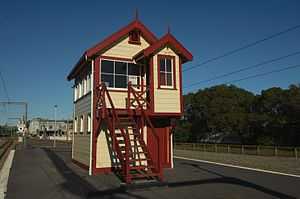Paekakariki Railway Station
Paekakariki | ||||||||||||||||
|---|---|---|---|---|---|---|---|---|---|---|---|---|---|---|---|---|
| Metlink suburban rail | ||||||||||||||||
 Signal House, Paekakariki Railway Station | ||||||||||||||||
| Location | Beach Road, Paekakariki | |||||||||||||||
| Coordinates | 40°59′14″S 174°57′16″E / 40.98722°S 174.95444°ECoordinates: 40°59′14″S 174°57′16″E / 40.98722°S 174.95444°E | |||||||||||||||
| Owned by | Greater Wellington Regional Council | |||||||||||||||
| Line(s) | North Island Main Trunk | |||||||||||||||
| Platforms | Island Platform | |||||||||||||||
| Tracks | Mainline (2) | |||||||||||||||
| Construction | ||||||||||||||||
| Bicycle facilities | Yes | |||||||||||||||
| Other information | ||||||||||||||||
| Fare zone | 8 | |||||||||||||||
| History | ||||||||||||||||
| Opened | 3 November 1886 | |||||||||||||||
| Electrified | 24 July 1940 | |||||||||||||||
| Services | ||||||||||||||||
| ||||||||||||||||
| Official name | Paekakariki Railway Yard Water Vats and Signal Box | |||||||||||||||
| Designated | 25-Sep-1986 | |||||||||||||||
| Reference no. | 4705 and 4706 | |||||||||||||||
| Official name | Paekakariki Railway Station and Goods Shed | |||||||||||||||
| Designated | 29-Nov-1985 | |||||||||||||||
| Reference no. | 4959 and 4961 | |||||||||||||||
Paekakariki Railway Station in Paekakariki on the Kapiti Coast, New Zealand is an intermediate station on the Kapiti Line for Metlink's electric multiple unit commuter trains from Wellington. Paekakariki was the terminal station of the commuter service from 1940 to 1983, when the service was extended to Paraparaumu, and to Waikanae in 2011.
The station was opened in 1886. Initially banking locomotives were attached at Paekakariki for the steep “hill” up to Pukerua Bay, and steam locomotives were changed there for electric locomotives to Wellington from 1940 to the 1960s .
The large wooden station building on an island platform is used by a museum, and has a bookshop in one section. There are a restored signal box and a level crossing at the south end.
Steam Incorporated has taken over most of the rail yard for rail preservation.
Several buildings are listed by the New Zealand Historic Places Trust: Category I; Signal Box and Water Vats; or Category II; Station, and Goods Shed, The station and yard is a historic area.
Services
Paekakariki is served by electric multiple units (EMUs) operated by Tranz Metro, a part of KiwiRail. Trains run every 30 minutes outside peak times, and more frequently during peak periods. All services running between Paraparaumu and Wellington stop at Paekakariki.[1]
KiwiRail Scenic carriage trains and diesel-hauled KiwiRail freight trains pass by the station but do not stop, except that southbound freights may stop to attach banks.
History
The line was part of the Wellington-Manawatu Line from Wellington built by the Wellington and Manawatu Railway Company (WMR), and the section to Paekakiriki was opened on 3 November 1886.
The name was spelt Paikakariki prior to 1905.[2]
The section to Paekakariki was electrified from 24 July 1940 after the completion of the Tawa Flat deviation, with locomotive-hauled carriage trains to Wellington for commuters. They were replaced by DM/D class units in the 1950s.
At Paekakariki from 1940 the steam locomotives of long-distance passenger and freight trains were changed for ED electric locomotives to Wellington. From the 1960s DA class diesel locomotives could handle trains into Wellington after the tunnels on the Pukerua Bay to Paekakariki section were lowered, and locomotives were no longer changed at Paekakariki.
FRom 7 May 1983 the Paekakariki to Paraparaumu section was electrified, and the suburban commuter service was extended to Paraparaumu. Before 1983 there were buses to Paraparaumu and Raumati from Paekakariki
The station used to have a refreshment room, and a steam locomotive depot. Locomotives were changed or a banker locomotive added for the steep bank up to Pukerua Bay, and from 1940 it was the terminal station for steam locomotives. Previously there was a signal box at each end of the station, a two-road shed with water, coal and oil facilities, a turntable, and (until Wellington Airport was opened) a rail/air freight depot for Paraparaumu Airport.[3]